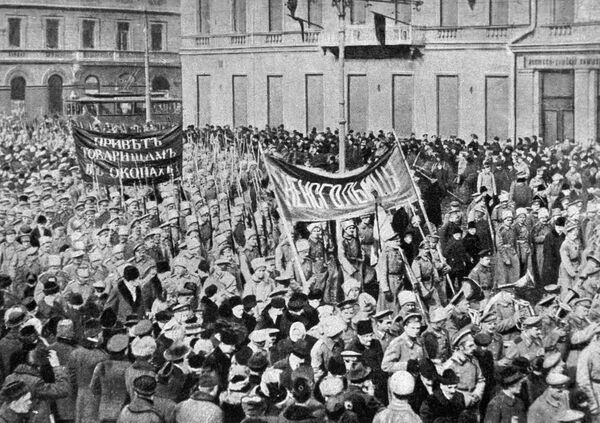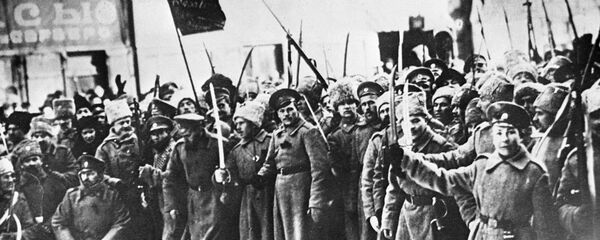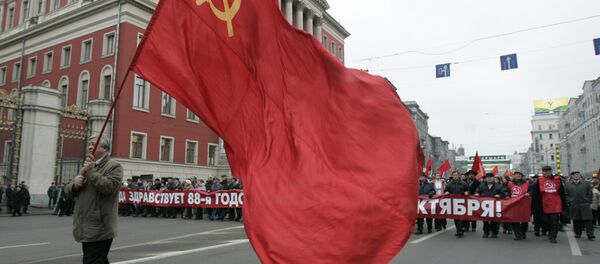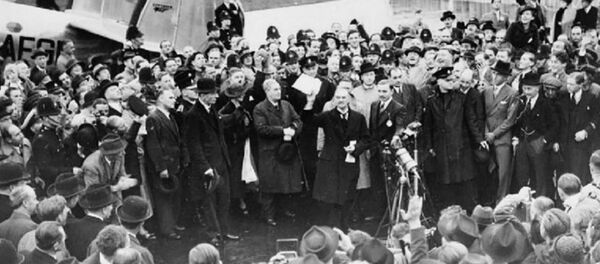"February 1917 marked the beginning of a revolutionary change in power in Russia that was accomplished in October," Michael Jabara Carley, a professor of history at the Université de Montréal and the author of "Silent Conflict: A Hidden History of Early Soviet-Western Relations," told Sputnik, commenting on the 100th anniversary of the Great October Socialist Revolution.
"The tsarist order was bankrupt and doomed. Almost everyone at the time said so. The immediate cause of the bankruptcy was the Great War [The First World War]," the Canadian academic stressed, adding that "the result was calamity marked by millions of casualties, large territories lost and an economy thrown into chaos by the unsustainable financial and economic demands of fighting a world war."
Russian Provisional Government: 'Neither Revolutionary, Nor Democratic'
The so-called February Revolution, which is regarded as a combination of a popular uprising with an elitist anti-monarchist plot, led to the abdication of Russian Emperor Nicholas II and the establishment of the Provisional Government.
Still, the Provisional Government "was neither revolutionary nor democratic," the academic pointed out: The crux of the matter was that it was largely controlled by the "bourgeois" urban and rural elites and old tsarist establishment "that was opposed to the revolution and attempted to block its further development."
October Uprising Was Relatively Bloodless
The professor explained why, contrary to popular belief, the October Revolution of 1917 that took place on November 7 (October 25 in the Julian calendar) was relatively bloodless.
"Well, in the first instance because the Provisional Government was utterly discredited. It had no popular support. It was a head without a body. It could give orders or issue decrees, but had no power to enforce them. In a revolutionary period, power comes from the support of the insurgent masses and the Provisional Government had none," Carley told Sputnik.
The professor suggested the 1917 could have been averted if old elites as well as their forebears had not blocked "political and economic evolutionary processes" in Russia.

'Provisional Government Became a Cork in the Bottle'
He pointed out, however, that "the Bolsheviks themselves were not united on all the big issues and most importantly on the seizure of power in October (the Julian calendar)."
"I would propose that the Provisional Government collapsed of its own rot. The insurgent masses led by the Bolsheviks only had to kick it over," Carley remarked.
Was the October Revolution of 1917 Inevitable?
"It is a question impossible to answer except in this way: popular revolutions come about because political and economic elites over time are too selfish to share wealth and power with the masses," Carley responded. "Like the tsarist autocracy, they treat the masses as a resource to be exploited and rung dry. When evolutionary processes of change fail, revolution is often the result."
According to the academic, it is wrong to think that such revolutions succeed "because of the evil genius and cruelty of a small revolutionary elite": "They succeed because of mass support and effective, responsive leadership."
The question then arises as to whether it was possible to follow an evolutionary path rather than go through a revolution.
"A revolution occurred because evolutionary processes of change to benefit the lives of ordinary people had failed," the professor responded. "Serfdom, inequality, exploitation, violence, continued unabated until 1917."
October 1917: 'Driver of Transformations Across the Globe'
The Canadian professor disagrees that the term "utopian" could be used with regards to the "Communist model," for instance.
"Is free, public education for everyone, no matter what their class, nationality or religion, utopian? Is the elimination of illiteracy, utopian? Are women's rights, or universal health care, utopian? Was the desire to create a more equal society, socially, economically and politically, utopian?" Carley asked, adding "in fact, that Soviet society was eventually able to withstand and then to destroy almost single-handedly the so-called invincible Nazi 'colossus.'"
Still, he believes that the 1917 revolution certainly was "a powerful driver of transformations" around the world since it "inspired successful revolutionary movements in China, Vietnam, Korea, and Cuba."
As Putin noted during his Valdai speech "many Western achievements of the 20th century were an answer to the challenge posed by the Soviet Union," such as "raising living standards, forming a strong middle class, reforming the labor market and the social sphere, promoting education, guaranteeing human rights, including the rights of minorities and women, overcoming racial segregation."
Red October: Allied Intervention and 'Beginning of Cold War'
The October Revolution became the trigger for the Civil War (1917-1922) and prompted the Allied intervention of major foreign powers in Russia.
"The foreign intervention against Soviet Russia fed a civil war and exacerbated the violence of the counter-revolution by many times over," Carley said. "On its own, the former tsarist elite could never have mounted such violent resistance to the October Revolution."
The professor underscored that after their failure to overthrow the Soviets, "the Western powers spent the next 70 years, with the exception of a truce between 1941-1945, in trying to harm or bring down the USSR and all those revolutions to which it had given birth."
According to the academic, the Cold War actually started in October (November) 1917.
"Just ask the Chinese, Vietnamese, Cubans, or North Koreans about the frightful price of resistance to US and Western hegemony," Carley remarked. "Or for that matter, we might ask, if we could, the soldiers, sailors and workers of Soviet Russia what price they had to pay to defend their revolution."
The views expressed in this article are solely those of the author and do not necessarily reflect the official position of Sputnik.







